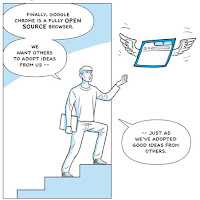Wired.com
By Ryan Singel

Cox made the announcement from the stage at the TechCrunch Disrupt conference in New York City.
The venue is hardly surprising and in keeping with Facebook’s recent reliance on sympathetic media outlets to combat the backlash against its overweening ambitions and abysmal privacy practices. TechCrunch’s founder and head Michael Arrington recently came to the company’s defense, chastising the media for being too hard on Mark Zuckerberg.
On Monday, the Washington Post gave the company free space on its Op-Ed page to write a nearly content-free post on how it was listening to users. In fact, the company is promising little to its users and seems set to continue its new practice of turning over user data to third parties without getting prior permission.
Coincidentally, Washington Post publisher Donald Graham is on Facebook’s board and is a mentor to Zuckerberg. As Ryan Tate at Valleywag puts it: “An opinion piece in one of the nation’s most prestigious newspapers carries more moral authority than a blog post on Facebook.com,” and that Graham has been a sort of “press consigliere for the startup founder.”
Image by Wired






















